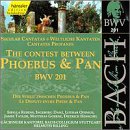| All Artists: Johann Sebastian Bach, Helmuth Rilling, Stuttgart Bach Collegium, Sibylla Rubens, James Taylor, Lothar Odinius Title: Bach: Secular Cantata BWV 201 Members Wishing: 1 Total Copies: 0 Label: Hanssler Classics Original Release Date: 1/1/2000 Re-Release Date: 10/19/1999 Genre: Classical Styles: Opera & Classical Vocal, Chamber Music, Historical Periods, Baroque (c.1600-1750), Classical (c.1770-1830) Number of Discs: 1 SwapaCD Credits: 1 UPCs: 040888206125, 4010276015611 |
Search - Johann Sebastian Bach, Helmuth Rilling, Stuttgart Bach Collegium :: Bach: Secular Cantata BWV 201
 | Johann Sebastian Bach, Helmuth Rilling, Stuttgart Bach Collegium Bach: Secular Cantata BWV 201 Genre: Classical
|
Larger Image |
CD Details |
CD ReviewsRilling in His Element: Whirling Winds in the Coffee House G Giordano Bruno | Wherever I am, I am. | 12/30/2008 (5 out of 5 stars) "The weakest element in the 155-CD Bach Edition from Brilliant Classics is the 8-CD set of Bach's 'Secular Cantatas,' recorded by the Kammerorchester Berlin under Peter Schreier in 1979-81. Those eight disks are so bad that even the stingiest Bach-lover will need to replace or supplement them. Fortunately, all the secular cantatas have been performed by the Bach-Collegium Stuttgart, under Helmut Rilling, with verve and style. What I have to say about BWV 201 - Der Streit zwischen Phoebus & Pan - applies more or less equally to all of Rilling's recordings of the seculars.
Most of the secular cantatas were composed for the pleasure of the 'collegium musicum' associated with the Neukirche in Leipzig, an ensemble of students, professionals, and skilled amateurs founded by Telemann, which Bach directed during the 1730s. The performances of the collegium were usually offered in the outdoor garden of Zimmermann's Coffee House. It's known that no more than 200 programs, with texts of the cantatas, were printed for such occasions, giving us an idea of the maximum audience that might have attended. The Contest Between Phoebus and Pan was probably Bach's inaugural cantata for his tenure as collegium director. It was performed on St. Michael's Day in 1729, and revived in 1735, '40, & '49. It's a colorful, humorous work, with windy sound-effects from the flutes, oboes, trumpets, and bassoon. If the music sounds curiously familiar, perhaps you recognize it from Bach's recycling of it in one or another of his sacred cantatas. In other words, there's no fundamental musical difference between Bach's secular and sacred music; the same aria that sounds pensive and penitent with one text can be made to sound jocular and festive with another text. Rilling and his six soloists do a superb job of rendering the festive affect of this jolly cantata about a singing contest between two gods, judged by a panel of lesser gods. Basses Matthias Goerne and Dietrich Henschel - Phoebus and Pan respectively - are lusciously pompous and robust in their roles, which require a good deal of agility as well as resonance. This is clearly a concert hall Bach, with larger and stronger forces of strings and choristers than could possibly have squeezed into Zimmerman's garden. Of course, we live in an era of concert hall performances; an audience of 200 wouldn't pay the union scale for the musicians. Ordinarily I'm skeptical of oversized ensembles performing Bach, especially because they tend to sound murky in recordings. Once the ideal of 'historically informed performance' is compromised, it's a slippery slope toward abominations like Glenn Gould playing Bach on his Steinway grand. But Rilling has the touch, the right sense of how 'big' to play these zesty secular works without letting them sound bloated. The standard of sheer musicianship of his Gächinger Choir and Stuttgart Collegium is impeccable, and probably higher than what Bach himself could have expected from his students and amateurs. So make yourself a cup of Kaffee mit Schlag, open your windows or take your sound-system outside, and relish the worldly pleasure of great music." |

 Track Listings (15) - Disc #1
Track Listings (15) - Disc #1